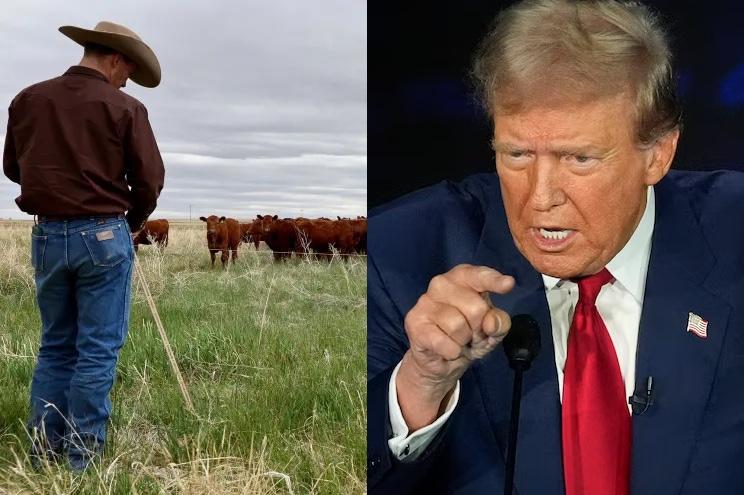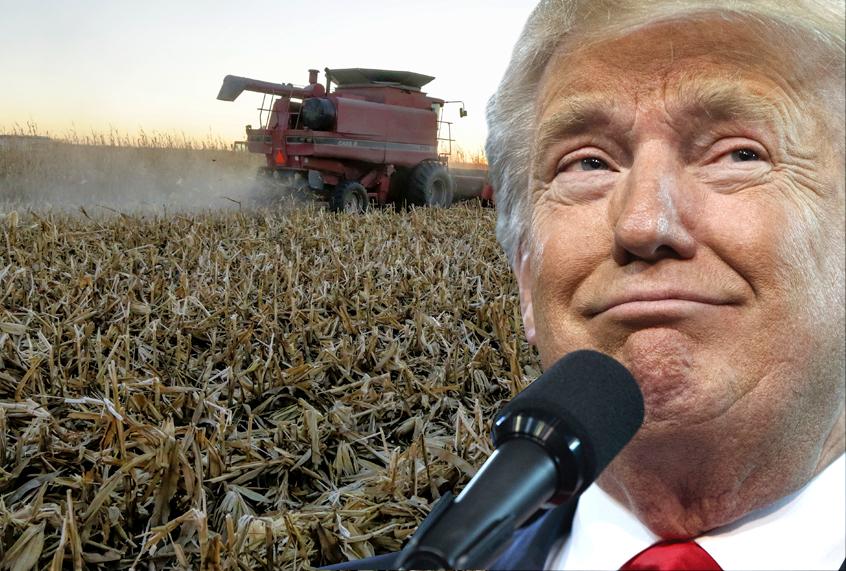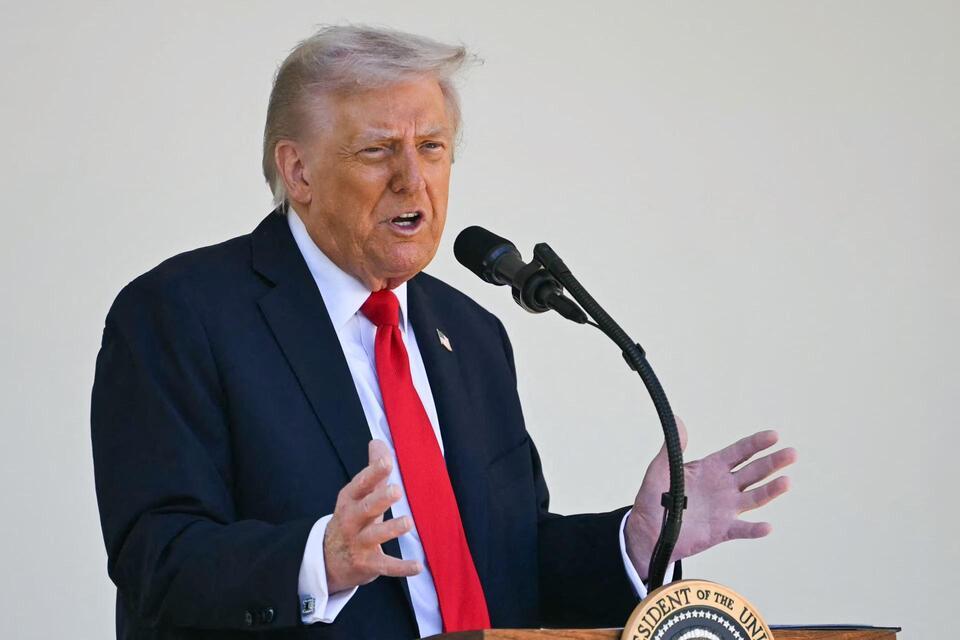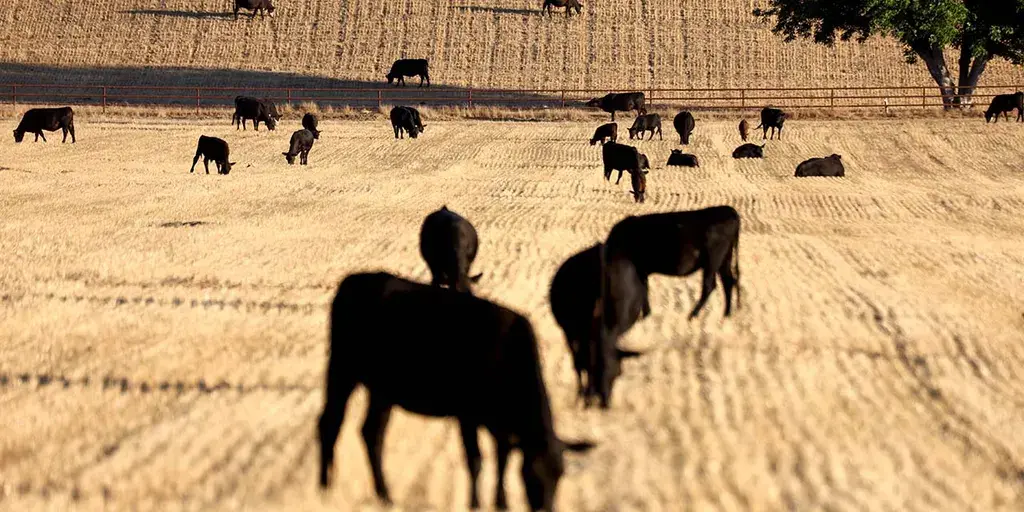In a blistering display of ingratitude that has rural America reeling, President Donald Trump lashed out at U.S. cattle ranchers on October 22, 2025, dismissing their pleas as clueless whining just days after floating a plan to flood the market with cheap Argentine beef—effectively kneecapping the very industry he once vowed to champion. Speaking to reporters aboard Air Force One en route to a Mar-a-Lago fundraiser, Trump snapped at questions about the backlash: “These ranchers don’t understand—Argentina is fighting for its life, and we’re helping a great ally. They have no idea how good they have it here.” The outburst, captured on video and exploding across social media with over 3 million views by midday, underscores a deepening rift in Trump’s MAGA base, where red-state farmers who powered his 2024 landslide now feel like collateral damage in his globe-trotting favoritism.

The controversy ignited on October 20, when Trump, fresh off a White House meeting with Argentine President Javier Milei—his ideological soulmate and self-proclaimed “anarcho-capitalist”—announced the U.S. was “thinking about” importing significant volumes of Argentine beef to slash soaring supermarket prices. Ground beef hit a record $6.32 per pound in August, per Labor Department data, amid a brutal cattle herd liquidation triggered by multi-year droughts scorching grazing lands from Texas to the Dakotas. U.S. inventories plummeted to a 75-year low in January, leaving ranchers—many barely solvent after feed costs doubled—finally tasting profits from tight supply and steady demand. Trump’s pitch? Buy Argentine cuts to “bring our beef prices down,” while bolstering Milei’s teetering regime with a fresh $20 billion currency swap, on top of another $20 billion in aid finalized earlier that week. “Consumers are a big factor in my thinking,” he insisted, framing it as populist largesse. But to ranchers, it’s a gut punch: Argentina already exports $801 million in beef to the U.S. annually—versus just $7 million the other way—exacerbating a lopsided trade that Trump’s own tariffs with China once funneled toward American soybeans, only for Buenos Aires to snatch that market post-2018 trade war.

The betrayal stings deeper because it’s self-inflicted. Trump’s first-term tariffs devastated Midwest farmers, costing billions in lost exports and prompting $28 billion in bailouts—Band-Aids that Agriculture Secretary Brooke Rollins is now dusting off with a proposed $3 billion “trade assistance” package for those still reeling. Soybean growers, who saw China pivot to Argentine suppliers after retaliatory duties, are apoplectic; now cattlemen fear a repeat. “This is an absolute betrayal to the American cattle rancher,” thundered the National Cattlemen’s Beef Association in a viral X post, echoed by the Ranchers-Cattlemen Action Legal Fund, which slammed the move as rewarding “BRICS-aligned entities” that dominate meatpacking and fix prices. Farm Action’s Christian Lovell, an Illinois producer, didn’t mince words: “President Trump risks acting more like the president of Argentina than the United States.” With four conglomerates controlling 85% of the market, experts like economist Joe Janzen at the University of Illinois warn that imports would line packers’ pockets—suppressing rancher payouts while barely denting consumer shelves, since Argentina supplies just 2% of U.S. beef.

Even Trump’s staunchest allies are balking. Nebraska Sen. Deb Fischer, whose state leads the nation in cattle, fired off a scorching X thread on October 21: “Deep concerns” over the proposal, which she called a direct threat to “our cattle ranchers” amid an already “bleak” ag economy battered by high interest rates and drought. Iowa’s Chuck Grassley piled on, questioning the wisdom of bankrolling a competitor that’s “stealing American farmers’ business” via soybean deals with Beijing. Kentucky Rep. Thomas Massie, no stranger to bucking the boss, blasted it as “not America first,” urging a revival of Country of Origin Labeling to shield consumers from unlabeled imports. Rep. Marjorie Taylor Greene amplified the fury from Georgia, relaying constituent pleas: “We love President Trump, please tell him to stop helping foreign countries and put Americans first.” On X, #BeefGate trended with over 150,000 posts by October 23, ranchers like South Dakota’s Cory Eich venting: “Nobody’s happy about it… take everything [from Trump] with a grain of salt.”

Milei’s shadow looms large. The far-right firebrand, whose deregulation crusade has plunged Argentina into hyperinflation and recession, hosted Trump at the White House on October 14, where the duo touted a “strategic partnership” against “globalist” foes like China. With Milei’s party facing midterm wipeout risks, Trump’s lifeline—framed as countering CCP influence in Latin America—smacks of personal patronage. “Argentina’s fighting for its life, young lady,” Trump barked at a female reporter pressing on U.S. farmer impacts, his tone dripping condescension. Critics, including the National Farmers Union, decry it as “rewarding” a nation that undercut U.S. exports: “The last thing we need is to reward them by importing more of their beef.”
This isn’t abstract policy—it’s existential for families like Texas rancher Nate Abeyta’s, whose Deep Cuts butcher shop in Dallas is sourcing scarcer domestic stock amid screwworm threats from Mexico. In cattle country, where 77 producers shutter daily, Trump’s berating feels like a final indignity. “We love you and support you,” Meriwether Farms pleaded in an open letter, “but solving problems ‘over there’ before here… Americans always come last.” As Rollins scrambles with incentives to “become ranchers” amid the exodus, the USDA insists it’s balancing aid with price relief. But economists doubt the math: Doubling Argentine imports might shave pennies off steaks, not dollars, while cratering live cattle futures that briefly dipped post-announcement before rebounding.
Trump’s “Beef with America” saga exposes the hollowness of his “America First” chant—a slogan that crumbles when foreign bromances beckon. Ranchers, who turned out en masse in 2024 despite his trade-war scars, now whisper of buyer’s remorse. In Trump’s world, tariffs “win” until they don’t; allies get bailouts, and the backbone of rural red America gets lectured on gratitude. If this is governance, it’s a recipe for revolt—not just at the ballot box, but at the feedlot gate. As one X user quipped, “Make Argentina Great Again?” For U.S. producers, it’s starting to feel like Make American Ranchers Extinct Again. Demand better: Protect our plates, our people, our pride—before the steaks run out.